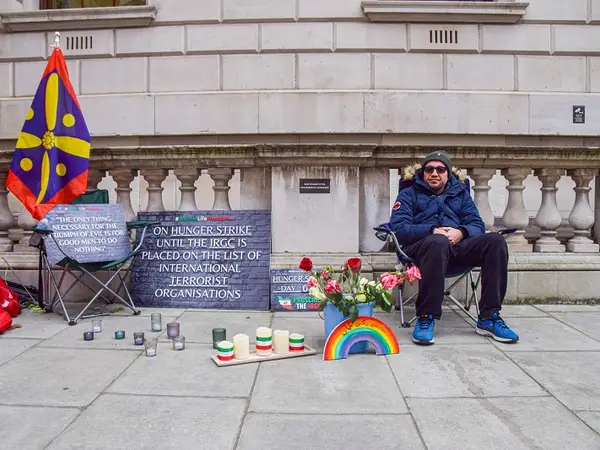After 35 days on hunger strike, a dual British-Iranian citizen's campaign calling on the UK government to designate the IRGC is finally gaining ground.
Vahid Beheshti has been battling the bitter winter outside the UK Foreign Office to raise awareness for the need to designate the Iranian terror group responsible for the deaths of hundreds of Iranian citizens since September.
He has got the attention of key political figures and has been joined by supporters hoping to force the UK government to take action on the brutal security forces.
On Monday, he met with the Minister of State for Security, Tom Tugendhat. Beheshti said, "He expressed his concerns for my health and emphasized that the Government's position is to proscribe the IRGC, but could not share the timescale in which this would happen."
His simple camp outside the Foreign Office has become a meeting place for activists, with others joining him.
His campaign has proven so successful that his name has been frequently mentioned during the sessions of the UK House of Commons. He has repeatedly urged UK lawmakers to hold official meetings with him instead of unofficial visits to his corner, to raise the profile of the issue to the highest echelons
Beheshti’s campaign is even reaching back home.
A boy in Iran holds a placard that urges Beheshti to break his hunger strike
As his body is getting weaker, temperatures at night dropping to freezing, his determination is growing stronger as he has vowed not to break the strike until the IRGC is listed as a terrorist organization.
The 46-year-old journalist is surviving on a daily diet of one cup of coffee, a few cubes of sugar, some salt and “plenty of water”.
“A policy of appeasement with Iran's Islamic Revolutionary Guard Corps has not worked in the last 44 years, and it will never work going forward,” Beheshti said last week, calling on Sunak, for “strong leadership” and to stand by his pledge to designate the group before his recent election.
Before embarking on his hunger strike, Beheshti held several meetings with British lawmakers, pleading with them for the proscription, but no action was made.
The tipping point came in February when Iran International was forced to close its London studios after repeated death threats from the regime.“The main point I highlight to British politicians is that their country’s principles are under threat today... I cannot understand why the British police, with all their power, cannot protect journalists against IRGC threats,” Beheshti said.
The Revolutionary Guard is the Islamic Republic’s leading military, intelligence and internal security juggernaut, responsible for cracking down on dissent inside Iran and managing the proxy militias throughout the region including the Houthis in Yemen which have caused devastation to the country.
Beheshti has been actively raising the voice of Iranians among the international community with his numerous interviews, speeches and video messages to global events on the uprising in Iran.
He says the designation is the first practical step toward further isolation of the Islamic Republic and the final overthrow of the regime.
Rallies against the IRGC have taken place globally including just last week in Brussels. The UK’s current list of 78 proscribed terrorist organizations includes Hamas, Hezbollah, and the Kurdistan Workers Party (PKK).
Several countries including the US, UK and EU have been cautious to designate the IRGC for fear it will further alienate the regime and in turn, limit negotiating capacity regarding its nuclear program.
In December, members of the UK House of Commons unanimously voted for a motion that urges the government to proscribe the IRGC but it has split the House.
Prominent Iranian opposition figures have repeatedly called on London to blacklist the Guards with exiled Prince Reza Pahlavi describing the move as to be akin to “pulling out the regime’s biggest tooth.”
